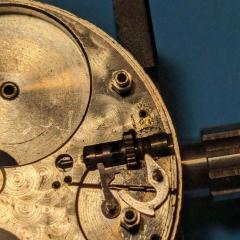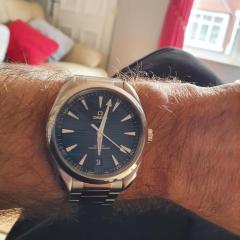What is the correct way to lubricate clock mainsprings?
-
Similar Content
-
Recently Browsing
- No registered users viewing this page.
-
Topics
-
Posts
-
By Neverenoughwatches · Posted
Correct one dip is expensive when the chemical is purchased as " one dip " which is why it is mostly reserved for these two small parts as far as information tells us it is mostly tetrachloroethylene. I use it bought as perchloroethyl used in dry cleaning processes, i cant say I'm overimpressed with it though it appears to me to be shellac safe. What may be a better solution for hairsprings is a high lab grade of pure benzine. IPA is mostly used as a rinse and water displacer and yes it does have the potential to dissolve shellac, personally i would not buy anything that has significant water dilution so 99.9% IPA is the way to go. And lastly the part you are cleaning dictates your choice of cleaning brush, delicate parts like a hairspring requires the finest artist's brush you can find. Plates and bridges can take a little more scrubbing, but always check to make sure the surface is being unharmed. And dont forget a stick of tip benzine soaked correctly shaped pegwood is your mate set up for cleaning dirty jewels and removing stubborn dried up lubrication. -
By Neverenoughwatches · Posted
Den / Dennison is a unit measurement of size this is actually a mainspring gauge . I haven't heard of a pivot been measured in Dennison before. Though the small thickness gauge is usually supplied with a Jacot tool and is more accurately known as a pivot destroyer. -
Could it be an abbreviation for Denier? "Denier (/ˈdɛniər/) or den (abbreviated D), a unit of measure for the linear mass density of fibers, is the mass in grams per 9,000 metres of the fiber. The denier is based on a natural reference: a single strand of silk is approximately one denier; a 9,000-metre strand of silk weighs about one gram." The pivot gauge looks interesting, however I wouldn't trust myself to drive a pivot into a wedge incase it jams and gets damaged/snaps trying to get it free. More a comment on my ability and incompetence than the quality or design of the tool 🤣
-
As I've seen multiple posts here about multiple types of cleaning solvents, I've done little more than confuse myself more thoroughly that I was before. To see if I understand things correctly... 1. Is One dip is a solvent which is a cleaner and also a protective rinse for hairsprings jewels and pallet stones only? Or can it be used on all the parts (like the case and wheels and all the things) It seems like that would be much easier as it's just "one dip" but it is very expensive. 2. Isopropyl alcohol is a great cleaner for manual cleaning or ultrasonic cleaning (only enclosed jar) just not on pallet fork as it may loosen the shellac holding the stones. Does it have to be 99%? 3. When buying a small manual cleaning brushes, does anybody suggest a certain material of the brush itself?
-







Recommended Posts
Join the conversation
You can post now and register later. If you have an account, sign in now to post with your account.
Note: Your post will require moderator approval before it will be visible.